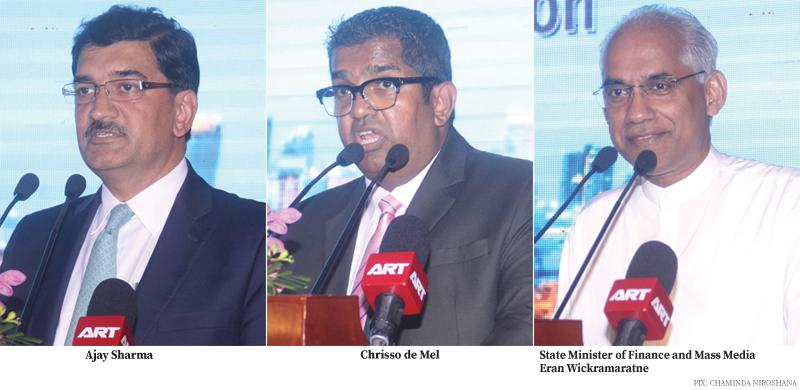
The government is liberalising many sectors and it is important to be more economically liberalised to be competitive in the global market place. There is a constant battle between the consumer and the producer. However, there needs to be a balance between the two fronts, State Minister of Finance and Mass Media Eran Wickramaratne told guests at the 48th Annual General Meeting of the Sri Lanka Shippers’ Council in Colombo last week.
“Foreign participation in the value chain is necessary to be globally competitive. We have to go beyond the local market and conquer the international markets. For this, we have to be open to what happens in the world. Our future lies in the potential of international trade and maximising the capabilities and capacities in this aspect,” he said.
The country has gone thorough change in a slower pace and this has resulted in many drawbacks. “We need to embrace technology which will give us a huge advantage over many matters.
“Our thinking process needs to be changed and processes should be competitive, efficient and productive. Though Sri Lanka has a vision it is not clear as to what is expected to be achieved through this. We need to have a vision to reach full potential in different sectors,” he said.
With the kind of resources and talent, Sri Lanka is a country that should be in the first quartile of all the countries in the world. The leadership should not be confined to political sphere, but leading through complexity.
There needs to be an industrial phase where we need to leap frog. Therefore, it is important to produce more entrepreneurs and look up to them rather than the politicians.
It is sad to note that the entrepreneurs comprised of only 2.7 percent of the working population in Sri Lanka and this is way behind the other Asian countries.
Among many challenges that the business community faces is the under-developed capital market in the country that is not supportive of entrepreneurs. This has negatively impacted the entrepreneurs as there is no mechanism to avert their risks in business dealings, he said.
The unique and strategic position Sri Lanka has in the international arena has provided an opportunity for the Hongkong and Shanhai Banking Corporation Limited (HSBC) to do more transactions. There are significant trends developed with regard to tariff in the international trade.
However, tariff and non-tariff barriers have affected the trade among the countries and have kept them outside without effectively allowing them to participate in international transactions, Regional Head of Global Trade and Receivables Finance HSBC Asia Pacific, Ajay Sharma said.
The challenges of rule based business are many and the need to effectively promote supply chain management is timely. As the rest of the world recording global trade with US stands at 15 percent there is room for the other countries to engage in trade more effectively.
The global trade volumes have continue to grow and this is a good sign. Mainly the growth in the international trade has been driven by the Asia Pacific markets.
The nature of trade flows has changed over the years. This is an interesting trend, he said. There is a demographic shift and Asian economies have grown strongly. This is a significant growth. This growth has continuously developed and add to generate employment opportunities and facilitate trade. The technology drives different ways of doing trade.
The e-commerce platform has created new avenues of trade. It is necessary to note that the change is the very nature of trade. The economies that are open grow faster than closed economies as there will be more trade taking place.
With the reforms been introduced in home markets there will be a new dimension to trade in the future. The Belt and Road initiative is moving forward and it is happening. Many Asian countries focus on EU markets. These are positive signs in moving goods across the boundaries.
The role of digitalisation and reducing frictions has become increasingly important. The digitalisation process has revolutionised the way that goods move across, Sharma said.
“There has been a need to create a common platform for the base industries. If there is a possibility to make all of the trade digitised, then the advantage of cost and time saving could be achieved.
There could be 33 percent of time reduction if digitisation takes place. This is the future for banks and customers. The need to drive the process of digitisation is becoming increasingly important as it is a far more efficient tool to provide impetus for international trade growth,” Sharma said. The past year has been a phenomenal year for the Shippers’ Council which has been in operation for the past 52 years. The Council has strengthened the ties with regional Shippers’ Councils such as Bangladesh, Malysia and Hongkong. It has help cement Sri Lanka as a logistics and shipping hub in the region, Sri Lanka Shippers’ Council Chairman Chrisso de Mel said.
“We have been engaged in on-going initiatives of the government for the betterment of the sector. The recent initiatives such as national Export Strategy, National Trade strategy and Single Window Investment Facilitation will augur well for the shipping industry. However, it is necessary to implement these action plans to be more competitive in the areas of international trade,” he said.
Noting that current political environment is not helping the shippers, he said that it is important to implement best strategies and ideas to move forward and sustain growth.
“It is time that we learn from our past mistakes. We are now living in a time that ethics and morals no longer consider to be virtues. People have lost value and purpose of life. Therefore, we need to uphold integrity, honesty and respect to enable a just and fair society which in turn will help in achieving the economical goals of the country,” de Mel said.
